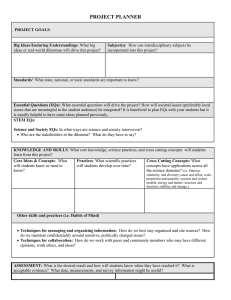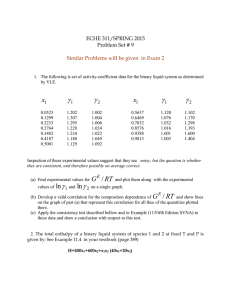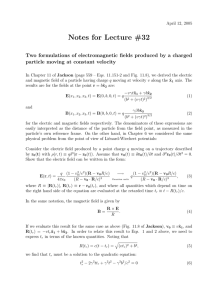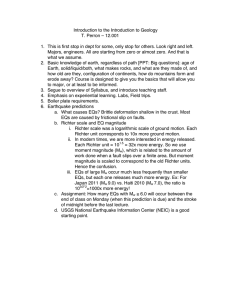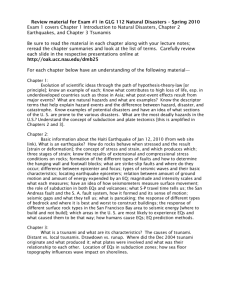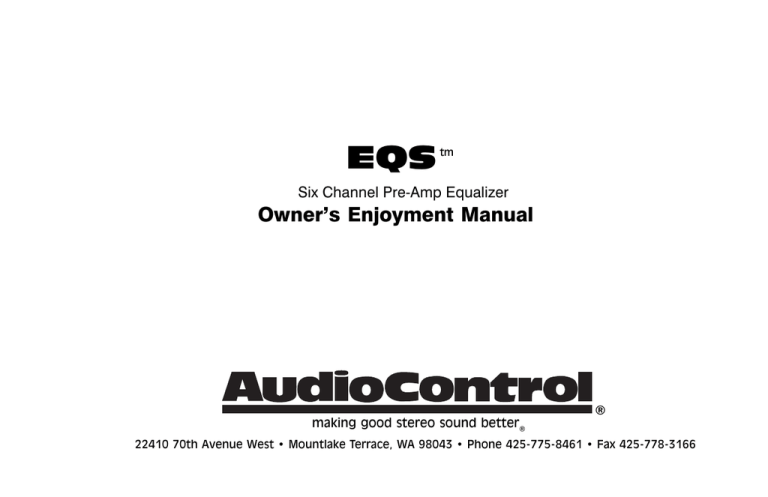
EQS
tm
Six Channel Pre-Amp Equalizer
Owner’s Enjoyment Manual
making good stereo sound better®
®
®
22410 70th Avenue West Mountlake Terrace, WA 98043 Phone 425-775-8461 Fax 425-778-3166
®
This page intentionally left blank.
Owner’s Enjoyment Manual
EQS
tm
Table Of Contents
Introduction
Introduction . . . . . . . . . . . . . . . . . . . . . . . . . . . . . . . . . . . . . . . 1
Congratulations on your purchase of the EQS, the
Features and Highlights . . . . . . . . . . . . . . . . . . . . . . . . . . . 2
worlds first six channel pre-amp equalizer from AudioControl, the leading manufacturer of performance signal proces-
Quick Installation Information . . . . . . . . . . . . . . . . . . 4
A Guided Tour of the EQS . . . . . . . . . . . . . . . . . . . . . . . . 5
Installation . . . . . . . . . . . . . . . . . . . . . . . . . . . . . . . . . . . . . . . . 8
Placement and Mounting . . . . . . . . . . . . . . . . . . . . 8
Power Wiring . . . . . . . . . . . . . . . . . . . . . . . . . . . . . . . . . . 8
Audio Wiring . . . . . . . . . . . . . . . . . . . . . . . . . . . . . . . . . . 9
Level Matching . . . . . . . . . . . . . . . . . . . . . . . . . . . . . . . 11
Equalization Adjustment . . . . . . . . . . . . . . . . . . . . 12
PFM Subsonic Filter . . . . . . . . . . . . . . . . . . . . . . . . . . 14
sors and analyzers. Whether this is your first product from
the rainforest dwellers of AudioControl or you are already a
firm believer, you will definitely enjoy how great the EQS
can make your performance autosound system sound.
Now before you start salivating too much just thinking
about the benefits of the EQS, take a few minutes to sit back,
have a latte’, decaffeinated if necessary, and
read through this manual. It contains lots of
useful facts and information - - and besides, we
spent a lot of time writing it!
Troubleshooting . . . . . . . . . . . . . . . . . . . . . . . . . . . . . . . . . 14
Warranty . . . . . . . . . . . . . . . . . . . . . . . . . . . . . . . . . . . . . . . . . . 15
Specifications . . . . . . . . . . . . . . . . . . . . . . . . . . . . . . . . . . . . . 17
Owner’s Enjoyment Manual
1
®
KEY FEATURES OF THE EQS
FEATURES AND HIGHLIGHTS
Dual-bandwidth Equalization: Car interiors vary
Here are some of the cool features that are enclosed in
this magical box:
·
Dual-bandwidth equalization
·
13 volt pre-amp line driver
·
Auto Selecttm Inputs
·
Voltage indicator LED’s
·
Speaker level inputs
·
PFM subsonic filter
·
Balanced differential inputs
widely in size and acoustic make-up. In addition doors, kickpanels, and rear decks don’t make the best location for
speaker placement causing your high performance speaker
system to sound somewhat lackluster. The EQS offers
maximum equalization controls for each area of the audio
spectrum. One-third octave bass equalization combined
with one-half and full octave high frequency equalization
offers an ideal level of control.
13 Volt Pre-Amp Line Driver: The EQS offers a high
quality line driver that takes the low output voltage of a
source unit and increases it up to 18dB (13 volts peak). This
allows you to maximize the signal-to-noise of your system
and drive your amplifiers to their maximum output without
clipping. No hiss, clicks, or pops plus maximum sound
quality.
Auto Selecttm Inputs: Whether your source unit has
two, four, or six outputs, the EQS will automatically switch
the inputs to maximize your equalization controls.
2
Owner’s Enjoyment Manual
EQS
tm
Speaker Level Inputs: If you are like many people and
like the look and features of your factory installed source
rainforest factory. We take every effort to ensure that you
will have many years of enjoyment out of your EQS. To
unit but feel it’s lacking power and bass, we have good news.
The EQS has a unique high impedance speaker level input
ensure the performance of your new toy, we highly recommend that you allow your authorized AudioControl dealer
that will interface with most factory installed source units
(even Bose) and let you add amplifiers and speakers to your
to perform the installation. Not only do they have all the
right knowledge and tools, but in the unlikely chance your
hearts content. However, unlike some of the cheesy speaker
level line output converters available, the EQS offers a very
EQS should stop working, we will back it with a limited five
years parts and labor warranty. Should you choose to install
high fidelity sound quality input.
it yourself we will still give you one-year parts and labor
warranty. To activate your warranty, you need to FILL OUT
PFM Subsonic Filter: This unique feature is legendary
with many AudioControl fanatics for it’s ability to fine-tune
the bass response of any system. Why waste power on nasty
subsonic information when your Programmable Frequency
Match (PFM) filter will help you clean things up.
Bulletproof Warranty: The most important feature
of all. Every AudioControl product is
selflessly designed and
manufactured by the
AND SEND IN YOUR WARRANTY CARD!
We also recommend that you save your invoice or sales
slip as proof of installation and ownership. Not only is it
necessary for warranty purposes, but should your EQS
”disappear” one day while your car is parked at your local
latte’ stand, you will find insurance companies very unforgiving without proof of purchase.
occupants of our
Owner’s Enjoyment Manual
3
®
QUICK INSTALLATION INFORMATION
For those of you short on time but high on ambition we
offer the following section to speed up your installation of
the EQS:
1. The EQS needs to be installed in the signal path between
your source unit and an external amplifier(s). If this is not
obvious to you, quickly pack up your EQS and run to your
nearest authorized AudioControl dealer to have them
perform the installation. You will thank us later.
2. Physically mount the EQS in a location that keeps it away
from soda spills, food crumbs, and curious fingers. However you will want to select a
know more, you should still read on, because you can
never know too much.
4. Level match the inputs of your EQS to your source and
then adjust the outputs to match with your amplifier
inputs.
Note: You will want to turn the gains on your amplifiers
DOWN to maximize your systems performance.
5. Now comes the fun apart. Set your equalization
controls to where your system sounds the most balanced yet
dynamic. More about this in the section titled “Adjusting
Your Equalizer”…and you thought you would not have to
read the rest on the manual. Hah!
location that allows you
access to the equalization
controls.
3. Hook up +12 volt power,
-12 volt ground, and remote
turn-on. If you need to know
more, then read on. Heck if
you don’t think you need to
Figure 1: Basic EQS System
4
Owner’s Enjoyment Manual
EQS
tm
FACTORY SETTINGS
Shipped
A GUIDED TOUR OF EQS
Options
Page #
PFM Subsonic Filter 33Hz
15Hz-63Hz
7
Input Grounding
Balanced
Unbalanced
7
Ground Isolation
Isolated
Choice of beverage
Micro-brew
200ohm
or Ground
7
Latté
19
1. Inputs: The EQS has two types of inputs, PRE-AMP
and SPEAKER LEVEL. These inputs should get their signals
from the main source unit/head unit and should attach to
either RCA jacks or speaker leads that are coming out of your
source unit. If your source unit has a front, rear, and
subwoofer pre-amp outputs, connect them to identical
inputs on your EQS. If the source unit only has front and
rear inputs, don’t worry about losing your bass equalization,
the Auto Modetm circuitry in your EQS automatically routes
your subwoofer equalization controls to the rear channels.
2. Input Gain Controls: These knobs allow you to
increase or decrease the signal level from your source unit to
the EQS. Most aftermarket source units will require an
increase whereas radios installed by the automobile manufacturer will probably require you to decrease the signal level.
3. Equalization Controls: Each one of these nifty
knobs is essentially a “tone’ control dedicated to a specific
part of the audio spectrum. They can be adjusted to help
your speakers match with the “acoustical fingerprint” of
your cars interior. In addition you can tweak them to
coincide with your listening preference.
Owner’s Enjoyment Manual
5
®
2
4. Output Level Controls: Although your EQS has
the ability to increase your signal voltage to 13 volts peak,
3
7
6
1
your amplifiers may not necessarily accept that much signal.
These controls allow you to regulate the proper amount of
pre-amp signal from the EQS to the amplifiers.
5. Output Voltage Indicators: These brightly
colored LED’s indicate the level of signal voltage that is
coming out of the various outputs of your EQS.
6. Outputs: These RCA connectors should be connected to the next component after the EQS, such as a
crossover or amplifier. Do not connect any speakers directly
to your EQS or to any home appliances, like your toaster.
7. Power Connections: This nifty connector is a
godsend to anyone who has tried to wire up their gear with
their body crammed in the trunk. You can wire up the
power, ground, and remote turn-on from the convenience
and then casually plug it in the back of your EQS.
Figure 2: Top view of EQS
6
5
4
Owner’s Enjoyment Manual
EQS
tm
UNDER THE COVERS
3
2
1. Input Grounding: For most systems you can leave
this jumper set in the BALANCED position. In some systems,
the source unit may look for a ground through the RCA
connection to the amplifier and create a ground loop, which
in turn can cause a whine (we are not talking about Merlot)
in your system. In that event, you should go ahead and
change the four jumpers to the UNBALANCED position.
2. Ground Isolation Selector: Occasionally alternator noise may appear in a system because the source unit and
amplifier are using different grounding schemes. To help in
this situation, we have provided alternative grounding
connections. Make sure your system is turned OFF before you
move these jumpers.
3. PFM Subsonic Filter: The EQS utilizes the world
famous AudioControl, PFM (Programmable Frequency
Match) filter to help with speaker control and amplifier
power management. To change the PFM frequency, it is as
1
Figure 3: Cut away of inside of EQS
(not to scale)
simple as removing the cover and changing the module,
which you will want to do when the power is disconnected.
Your authorized AudioControl dealer carries an assortment
of these modules.
Owner’s Enjoyment Manual
Balanced
Unbalanced
Ground
Isolated
200W
7
®
INSTALLING THE EQS
B. EQS Power Wiring
Up to this point everything you have read has served to
educate you on the operations of EQS. We are sure that you
are chomping at the bit to install EQS so we recommend you
read the following sections very carefully.
A. Placement & Mounting Of EQS
Placement: The EQS needs to be installed in the signal
path after your source unit but definitely before your
amplifiers and or any active crossovers. The chassis is usually
mounted in the rear of the vehicle close to the amplifiers as
possible.
Mounting: Once you have selected a permanent
mounting location, position the unit and mark the appropriate mounting holes with a felt-tip pin or scratch awl. Before
doing anything else, make sure you are not about to drill a
hole in a gas tank or piercing any existing wiring. Nothing
ruins your day more than an expensive repair bill. Drill a few
small pilot holes and secure the chassis of the EQS with self-
WARNING: Failure to disconnect the negative terminal of
your battery prior to the installation of you EQS can result in a
warm tingly feeling.
Remote Turn-On: Connect a 22 to 18 gauge wire from
the head-unit’s remote turn-on to the “Remote” connector
on the EQS .
Positive(+12V) Connection: Insert a 12-18 gauge
wire into the connector labeled “Power” on the nifty
connector of your EQS. Connect it to a good constant
source of 12 volts (we suggest the battery), fused at 2 amp.
Ground Connection: Use the same gauge wire as you
did for the positive connector and run it from the “Ground”
connector on the EQS to the negative terminal of the
battery, a ground bus, or a verified ground location. The
factory head unit ground is not a good ground!
When the electrical connections are complete, you may
reconnect the negative terminal to your battery.
Remote
Power
Ground
tapping screws.
Figure 4: Side view of EQS
8
Owner’s Enjoyment Manual
Power Connector
EQS
tm
C. EQS Audio Wiring
Planning: As you may already have guessed, there are
numerous ways to configure the EQS in your audio system.
Spend a little quality time planning out your system and
even sketching it out on paper. The following diagrams are
just a few of the system options:
Figure 5: EQS with Four Channel Source Unit and 3XS crossover
Owner’s Enjoyment Manual
9
®
Figure 6: EQS with THREE.1
Figure 7: EQS with factory installed source unit
10
Owner’s Enjoyment Manual
EQS
tm
D. Level Matching
4. Starting with the EQS “Front Input” gain control,
If you have ever listened to a friend’s “killer” car audio
system and heard lots of hiss, clicks or pops, then you have
experienced an improperly level matched system. When a
performance autosound system is properly level matched,
you should get the maximum output from your source unit
and amplifiers without any clipping or that annoying hiss!
The following steps will help you through the process,
although at the end of the day, your ears will be your guides!
1. Set your source units fader and balance controls to
their center positions. If your source unit has subwoofer
output (and you are using it), set the output level at minimum or “0”.
2. Disconnect the connections between your EQS and
the amplifier(s)…otherwise get some ear plugs.
3. Start playing some relatively dynamic music and set
the volume on your source unit to about 3⁄4 of maximum.
You should not be hearing anything at this point. If you are
hearing music, go back to step #2; if you are hearing voices
go see a doctor!
increase or decrease the “Input Gain” control until the
“Overload” LED begins to flicker steadily with the music. Do
the same for the “Rear Input” and “Subwoofer Input”.
• Important Note •
For Four Channel Or Speaker Level Input Users: If you
are only using the “Front” and “Rear” or “Speaker Level”
inputs, you will find that the subwoofer equalization
now works on the rear channels. Therefore, the “Rear”
input gain is actually controlled by the “Subwoofer”
input gain control.
5. Now adjust the output level control until the “2 volt”
or “5 volt” light starts to flicker. You will set the output
voltage to match up with your amplifiers input gain levels.
If you don’t know how much this is, ASK the amplifier
manufacturer or read the owners manual of the amplifier.
6. Very Important – Set the input gains on the
amplifier(s) at minimum!
7. Double check that you performed Step #6
8. Decrease the volume control on your source unit and
re-connect the RCA’s between the EQS and the amplifier(s).
Owner’s Enjoyment Manual
11
®
9. Now increase the volume on your source unit to your
normal listening level. For some of you, this may be louder
than others!
10. At this point you may find yourself going back and
adjusting the “Output Level” controls on your EQS to
balance the front, rear, and subwoofer sections of your
system to accommodate for the speaker placement and
efficiency. Speakers on the rear deck of your car will probably sound louder that the ones in your doors!
E. Equalization Adjustment
makes a really good one. If you cannot locate an RTA, you
probably want to have your authorized AudioControl dealer
perform the equalization adjustments as they will have one.
You can certainly adjust your EQS using your ears, however
an RTA will give you the best results.
2. Begin playing pink noise through your system and
place the microphone for your analyzer on a microphone
stand in the drivers seat. Take a careful look at the “curve”
on your analyzer and how one frequency combines with the
next.
When it comes to music, everyone has his or her own
particular taste. Some people want pounding bass and crisp,
blood curdling highs. Others may prefer a “flat” response
(whatever the heck that is). At the end of the day, most
people just want their system to sound balanced and “just
like it did in the store” or similar to their buddy’s car. The
following equalization guidelines should help you achieve
Figure 8: Sample Curve
your own personal audio nirvana.
1. For optimum performance, get your hands on a test
compact disc that contains pink noise and a good quality
RTA (real time analyzer); we happen to know someone who
12
Owner’s Enjoyment Manual
EQS
tm
There is no one curve that will satisfy every person, as we
all have different tastes.
How else can you explain Liberace or rice cakes? The key
is to use your EQS to help balance your system from one
frequency to the next and give your speakers the sparkle,
sizzle, detail or punch that the acoustics of the car have
compromised.
3. You will want to start equalizing by removing or
cutting any large bumps, peaks, or areas with too much
energy at a particular frequency. Next, boost the ranges that
do not have enough energy. We strongly recommend that
you cut or decrease energy before you boost.
4. Although the plethora of knobs on your EQS can be
intimidating, fear not as they were designed to give enough
control to maximize your systems performance but not
enough to get you in trouble. Here is an explanation of the
key areas you should focus on:
Sub-bass: 100 Hz and below – A car without bass is
like a day without sunshine… unless you live where we do
because most of the days in the Pacific Northwest do not
have sunshine. This area is one of the more critical although
it is also one of the most difficult to properly reproduce.
Most people refer their bass frequencies to be 6 to 9 dB louder
than the rest of their system, although there are some crazy
folks that prefer their bass substantially louder. They key in
this area is to have enough speakers and power to produce
the amount of bass you desire but don’t use the controls on
the EQS to try and force your speakers to produce sounds
they can’t. Too much bass boost creates a condition called
“speakerus explodus”, which is not pretty to hear or watch.
Midbass: 100 Hz to 300Hz – The phrase, “too much of
a good thing” can certainly apply to the midbass frequencies.
This is the transition area of the audio spectrum that is an
octave above your sub-bass frequencies and several octaves
below your midrange. Most autosound systems have too
much midbass due to the fact that speakers mounted in the
doors or kick panels cause resonance’s or peaks in the
response curve. These peaks in the midbass can actually
mask or block sounds in the all-important midrange area
causing your system to sound dull or lifeless.
Midrange: 300Hz to 3Khz – Musical instruments,
vocals, mid-range percussion and many things we associate
with imaging and staging happen in this area of the band-
Owner’s Enjoyment Manual
13
®
width. For that reason you will want to keep this area as smooth
On most systems, the factory-installed module (33Hz) is
and balanced as possible. Too much boosting can make you feel
like your listening to your system in a tile bathroom. Not enough
fine. However, if you know the tuning frequency of your
speaker enclosure (porting frequency or 3dB down point),
energy midrange sounds empty and dry.
you might try setting your PFM module to that frequency. If
you want to protect your speaker system even more, you
Treble: 3KHz and Up – If midrange is the cake, then
these high or upper frequencies are considered the frosting.
Many autosound systems start a gradual decline in this area
which is why speaker placement is very important. The EQS
only gives you a few controls in this area because too much
boosting can really make a speaker sound un-natural.
F. PFM Subsonic Filter
might even try a higher frequency as it will probably sound
better than you think.
G. Troubleshooting
No Power: If the Power LED on your EQS will not turn
on, check to make sure that the power wire and remote turn
on wires are connected or a fuse has not blown.
Many car audio systems truly push the limits of their
subwoofer...without really knowing it. Tuned enclosures
Sounds Distorted: Should your system sound distorted or your speakers are moving way too much, you
affect the roll-off of many speakers, yet lots of source material forces the speakers to play lower than expected. The net
should make sure you have your levels matched properly and
that your amplifier gains are set at minimum. If this checks
result is wasted amplifier power and damaged speakers.
The AudioControl PFM (Programmable Frequency Match or
out okay, you will want to look at your EQ controls
to insure that your boost levels are not too high.
Pure F#@&% Magic) filter is a programmable subsonic filter.
It allows you to only let the speaker play as low as it should
be playing. Because every system is different, we allow you
to change the PFM roll-off frequency to whatever you
Still Sounds Distorted: Set the PFM filter higher to
match your speakers response.
choose.
14
Owner’s Enjoyment Manual
EQS
tm
Output Voltage LED’s Don’t Light Up: If your
system is playing music but none of the output LED’s are on,
there is a good chance that the output voltage of your source
unit is not that high. Now before you call us say, “The guy at
the store said my radio has high-voltage outputs”, you might
want to face the fact that there is “Engineering Voltage” and
there is “Marketing Voltage”. Without picking on any
particular source unit, remember that you do get what you
pay for.
IF YOU LIKE EQS, YOU’LL LOVE...
If you need a crossover for
your system that keeps up
with your EQS, the 3XStm is a
4 channel, 2-way crossover
with breathtakingly steep
24dB per octave slopes. If
performance is important to
you, then you will appreciate the 3XS. Of course if you are
just looking for deeper, breath-taking bass, than The Epicenter our patented (U.S.
The THREE.1 is the perfect in-dash equalizer for those of
you who like the sound and detail of the EQS but want to
have some control of your system from the dash of your car.
Of course you should not be driving while tweaking your
patent # 4,698,842) bass
restoration processor is just
the hot ticket. It puts the
woof back in your woofers!
THREE.1, but enjoy it nevertheless.
Owner’s Enjoyment Manual
15
®
And now a word from the legal department...
THE WARRANTY
People are scared of warranties. Lots of fine print.
Months of waiting around. Well, fear no more, this warranty
is designed to make you rave about us to your friends. It’s a
warranty that looks out for you and helps you resist the
temptation to have your friend, “...who’s good with electronics”, try to repair your AudioControl product. So go ahead,
read this warranty, and then take a few days to enjoy EQS
before sending in the warranty card and comments.
“Conditional” doesn’t mean anything ominous. The
Federal Trade Commission tells all manufacturers to use the
term to indicate that certain conditions have to be met
before they’ll honor the warranty. If you meet all of these
conditions, we will warrant all materials and workmanship
on your EQS for one year from the date you bought it (five
years if it is installed by an authorized United States AudioControl dealer). We will fix or replace it, at our option, during
that time.
Here are the conditional conditions:
1. You have to fill out the warranty card and send it to us
within 15 days after purchasing your EQS.
2. You must keep your sales receipt for proof of purchase,
showing when and from whom the unit was bought. We’re
not the only ones who require this, so it’s a good habit to get
into with any major purchase.
3. Your EQS must have originally been purchased from an
authorized AudioControl dealer. You do not have to be the
original owner, but you do need a copy of the original sales slip.
4. You cannot let anybody who isn’t (A) the AudioControl
factory; (B) somebody authorized in writing by AudioControl
to service your EQS. If anyone other than (A) or (B) messes
with your EQS, that voids your warranty.
5. The warranty is also void if the serial number is altered
or removed, or if EQS has been used improperly. Now that
sounds like a big loophole, but here is all we mean by it.
Unwarranted abuse is (A) physical damage (don’t use the
EQS for a jack stand); (B) improper connections (120 volts into
the power jack can fry the poor thing); (C) sadistic things.
16
Owner’s Enjoyment Manual
EQS
tm
This is the best mobile product we know how to build, but if
EQS SPECIFICATIONS
you mount it to the front bumper of your car, something
will go wrong.
All specifications are measured at 14.4 VDC (standard automo-
6. If an authorized United States AudioControl dealer
installs your EQS, the warranty is five years, otherwise the
warranty is one year.
Assuming you conform to 1 through 6, and it really isn’t
all that hard to do, we get the option of fixing your old unit
or replacing it with a new one.
LEGALESE SECTION
This is the only warranty given by AudioControl. This
warranty gives you specific legal rights that vary from state to
state. Promises of how well the EQS will perform are not
implied by this warranty. Other than what we have covered in
this warranty, we have no obligation, express or implied. Also,
we will not be obligated for direct or indirect consequential
damage to your system caused by hooking up the EQS.
Failure to send in a properly completed warranty card
negates any service claims.
tive voltage). As technology advances, AudioControl reserves
the right to continuously change our specifications, like our
Pacific Northwest weather…although we are working on it.
Maximum input level . . . . . . . . . . . . . . . . . . . . . . . . . . . . . . . . . . . . 15 Vrms
Maximum speaker level input . . . . . . . . . . . . . . . . . . . . . . . 100 watts
Maximum output level . . . . . . . . . . . . . . . . . . . . . . . . . . . . . . . 13.5 Vpeak
Input gain . . . . . . . . . . . . . . . . . . . . . . . . . . . . . . . . . . . . . . . . . . . . . . . . . 18 dB
Frequency response . . . . . . . . . . . . . . . . . . . . . . . 10Hz-100kHz; ± 1dB
Total harmonic distortion . . . . . . . . . . . . . . . . . . . . . . . . . . . . . .0.003%
Signal to Noise ratio . . . . . . . . . . . . . . . . . . . . . . . . . . . . . . . . . . . . . - 110dB
Balanced input noise rejection . . . . . . . . . . . . . . . . . . . . . . . . . . . 60dB
Input Impedance . . . . . . . . . . . . . . . . . . . . . . . . . . . . . . . . . . . . . 20 Kohms
Output Impedance . . . . . . . . . . . . . . . . . . . . . . . . . . . . . . . . . . . 150 Ohms
Equalization Cut/Boost . . . . . . . . . . . . . . . . . . . . . . . . . . . . . . . . . ± 12 dB
Power supply . . . . . . . . . . . . . . . High headroom PWM switching
Power draw . . . . . . . . . . . . . . . . . . . . . . . . . . . . . . . . . . . . . . . . . . . . . . 500mA
Recommended fuse rating . . . . . . . . . . . . . . . . . . . . . . . . . . . . . . 2 Amp
Size . . . . . . . . . . . . . . . . . . . . . . . . . . . . . . . . . . . . . . . 8.8” W x 9.3"D x 1.3"H
Weight . . . . . . . . . . . . . . . . . . . . . . . . . . . . . . . . . . . . . . . . . . . . . . . . . . . 3.25 lbs
Not affilated with Microsoft, Starbucks or other seattle area companies — at least not today.
© 2001, AudioControl, a division of Electronic Engineering and Manufacturing, Inc. All rights reserved
Owner’s Enjoyment Manual
17
AudioControl, Making Good Stereo Sound Better, EQS,
The Epicenter, EQL, AutoMode and EQX are all trademarks
of Electronic Engineering and Manufacturing, Inc.
This manual was conceived, designed, and written on
several bleak, windy, and dreary rain-drenched days at our
home in the Pacific Northwest Rainforest. The latte’s were
hot and the Heffeweizen’s were cold...like our weather.
®
making good stereo sound better®
22410 70th Avenue West
Mountlake Terrace, WA 98043 USA
425-775-8461 Fax 425-778-3166
www.audiocontrol.com
© 2001, AudioControl, a division of Electronic Engineering and
Manufacturing, Inc. All rights reserved
P/N
9130640

